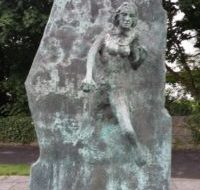29 September 2017, Université de Franche-Comté, Besançon
Keynote Speaker: Florence Binard, Université Paris 7 – Paris Diderot
“The Angel in the House” is the image most commonly retained of British women in the nineteenth century. This reductive and repressive ideal, emerging from values propagated by the literary, religious and medical political discourses of the time, still persists today in the collective unconscious. Although this model has increasingly been questioned by researchers in the humanities, the focus has tended to be on the beginning of the 20th century.
This one-day conference aims to pursue this still neglected area, bringing the Victorian and Edwardian woman further out of her “cloister” or “sphere”, and exploring the destinies of those women who occupied the public space in Great Britain, Ireland and, by extension, the Empire: activists, explorers, artists, writers and sportswomen to name but a few.
The endorsement of women in the public space may be viewed in dialectical terms, as an ongoing process which, while it is still not complete today, was a site of increasing negotiation in the long nineteenth century, with women’s right to vote and to attend university standing as two particularly noteworthy landmarks.
One important question underpinning our reflection would be whether women simply “broke into” a hitherto exclusively masculine space or if they benefitted from the evolution of some traditionally female realms—charitable institutions’ increased interest in more political concerns for instance—thereby causing a shift in the very terms of political debate towards more humanitarian ends.
Another angle of exploration might be how women were able to circumscribe or even overcome the public / private divide and the gender dualisms that sustained it (culture / nature, rationality / emotionality, power / morality and so forth) by deploying their supposedly feminine qualities in the service of their own emancipation. The argument of women’s greater “moral purity” advanced by the Suffragettes, for example, had in fact already served female members of the Anti-Corn Law League in the period around 1840: their campaign against the importation of grain was couched in pious philanthropic terms that were a far cry from “grossly” political demands that would have been deemed unsuitable for any respectable lady to articulate.
If this pattern were indeed to prove a prominent one in the course of the period under study, it might then be possible to speak of the arrival of women in the public space not just as one of a number of symptoms evidencing the gradual opening up of society, but rather as a factor that in and of itself influenced the course of social and political history (the key role played by women during the Easter Rising of 1916 would be just one example of this).
Another area of investigation would be the status of those “little” women —prostitutes, factory workers— who operated in the shadows or wings of the public space, silently and invisibly transgressing “official” Victorian ideals, or the negotiation by women of in-between spaces, on the threshold of public and private spheres. Working-class women were active in the Reform Movement from the 1810s and they would later join the Chartists. Although women from the lower or under classes were scarcely (if ever) in the public spotlight, their limited household resources often forced them to penetrate the public world of work where certain sectors (the textile industry in particular) actually recruited a predominantly female workforce.
We welcome proposals in English or French
Please send your abstracts to the organising committee
patrice.bouche@univ-fcomte.fr (CRIT)
shirley.douliere@univ-fcomte.fr (CRIT et CLIMAS)
margaret.gillespie@univ-fcomte.fr (CRIT)
together with
- 300-word maximum abstract in French or English
- Short biographical note (academic position & affiliation, laboratory, area of research)
- 5 key words
Deadline for abstracts: May 2nd
Notification: May 15th
A selection of papers will be published
